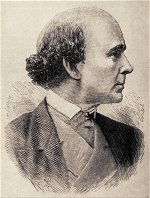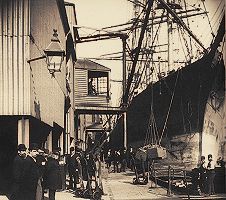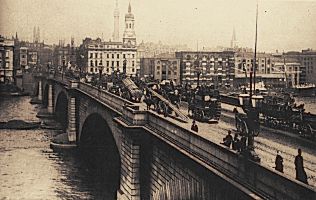My dear readers, I must now give you a brief account of my trip to the mighty city of London. If I can remember, it might be either 19 or 20 years ago, and in the merry month of June, when trees and flowers were in full bloom, and owing to my poverty I couldn’t have gone to London, only that I recieved a letter — a forged one — supposed to be written by Dion Boucicault, the Irish dramatist, inviting me down to Stratton’s Restaurant at twelve o’clock noon to have lunch with him, as he intended to engage me for a provincial tour to give entertainments in the provincial towns throughout Britain, and he would give me a big salary. Well, my dear friends, of course I felt delighted when I read the letter, so I went to Stratton’s Restaurant just as the town clock struck twelve. I was received very kindly, and shown upstairs to a little room. I think it was the smoking room, and I knocked at the door, and it was answered by one of the gentlemen. Of course I knew him, and he introduced me to the gentleman who was impersonating the character of Dion Boucicault, and he asked me how I was, and I told him I was very well, hoping to find him the same. Then he told me he had heard so much about my histrionic abilities that he would engage me and give me a salary of £20 weekly, food included, and the other gentlemen present said it was little enough for a man of my abilities; but all the while I know he was an impostor. Then he requested me to recite my famous poem, “Bruce at Bannockburn,” and of course I did so, and when finished he declared if I would recite that before a Scottish audience in London it would pull down the house. Then he told one of the gentlemen to fetch in some refreshment for Mr McGonagall, for he was more then delighted with my Bannockburn recital. Then a gentleman waiter came in with a little refreshment on a tea tray, simply
A penny sandwich and a tumbler of beer,
Thinking it would my spirits cheer.
And I remember I looked at it with a scornful eye before I took it, and I laid it down on a little round table beside me and screwed my courage to the sticking place, and stared the impostor Boucicault in the face, and he felt rather uneasy, like he guessed I knew he wasn’t the original Boucicault, so he arose from his seat and made a quick retreat, and before leaving he bade me good-bye, telling me he would see me again. Then I kept silent, and I stared the rest of my pretended friends out of countenance until they couldn’t endure the penetrating glance of my poetic eye, so they arose and left me alone in my glory. Then I partook of the grand penny luncheon I had received for my recital of “Bannockburn,” and with indignation my heart did burn.
 I went direct to the Theatre Royal, and inquired for Mr Hodge, the manager, and I saw him and I showed him the letter I had received from Dion Boucicault, as I didn’t believe it was from him, and when he looked at it he said it wasn’t his handwriting, and how I had met with a great disappointment no doubt, and asked me if I would allow him to make an extract from the letter and he would send it to Boucicault, so I said I would; so he made an extract, telling me he mentioned my poor circumstances in it, and he had no doubt but Mr Boucicault would do something for me by way of solatium for my wounded feelings and for using his name in vain. He told me to come down to the theatre inside of three days, and he would have a letter from Boucicault by that time, he expected, so I thanked him for his kindness, and came away with my spirits light and gay.
I went direct to the Theatre Royal, and inquired for Mr Hodge, the manager, and I saw him and I showed him the letter I had received from Dion Boucicault, as I didn’t believe it was from him, and when he looked at it he said it wasn’t his handwriting, and how I had met with a great disappointment no doubt, and asked me if I would allow him to make an extract from the letter and he would send it to Boucicault, so I said I would; so he made an extract, telling me he mentioned my poor circumstances in it, and he had no doubt but Mr Boucicault would do something for me by way of solatium for my wounded feelings and for using his name in vain. He told me to come down to the theatre inside of three days, and he would have a letter from Boucicault by that time, he expected, so I thanked him for his kindness, and came away with my spirits light and gay.
Well, I waited patiently till the three days were expired, then called at the Theatre Royal and saw Mr Hodge, the manager, and he received me very kindly, telling me he had received a letter from Mr Boucicault with a £5 cheque in it on the Bank of Scotland, so he handed me five sovereigns in gold along with Boucicault’s letter. I thanked him and came away, and in the letter Boucicault felt for me very much, saying practical jokers were practical fools, which in my opinion is really true. So, my dear readers, it was through me getting the £5 from Boucicault that I resolved to take a trip to London.
A steerage return passage at that time was £1, so I purchased a ticket and made up my mind to go. I remember it was in the month of June, when trees and flowers were in full bloom, and on a Wednesday afternoon I embarked on board the steamer “London,” and there were a few of my friends waiting patiently at the dockyard to see me off to London and wish me success in my perilous enterprise, and to give me a hearty cheer my spirits for to cheer, and a merry shake of hands all round, which made the dockyard loudly resound. Then when the handshakings were o’er the steam whistle began to roar. Then the engine started, and the steamer left the shore, while she sailed smoothly o’er the waters of the Tay, and the passengers’ hearts felt light and gay. There weren’t many passengers, I remember, but seemingly they all felt merry as the steamer drew near to Broughty Ferry, because the scenery in that direction is very fascinating to be seen, the seascape so lovely and green. When the steamer had passed by Broughty Ferry a few miles I remember the passengers began to get weary, and we were all sitting on the deck, and some of them proposed that they should have a song, so a lady sang a song, but I don’t remember the name of it; it’s so long ago, but it’s of no great consequence. When they had all sung I was requested to give a recital, and I gave them the “Battle of Tel-el-Kebir,” which was well received, and I got an encore, and I gave them the “Rattling Boy from Dublin Town,” and for which I received a small donation, and that finished the entertainment for the night. Then the steerage passengers bade me good-night and retired to their berths for the night, and me along with the rest. Well, the steamer sailed smoothly along during the night, and nothing happened that would the most timid heart affright, and the passengers slept well, including myself, owing to the smooth sailing of the good ship.
 All went smoothly as a marriage bell until the good steamer landed us safe at the wharf, London, in the River Thames. Then there was shaking of hands and bidding each other good-bye, and each one took their own way, some on holiday, others on the look-out for work; such was the case with me. Well, as soon as I got ashore I held on by the Fish Market, and as I drew near very discordant sounds broke upon my ear. The babbling of the fishmongers was disagreeable to hear; and I had my properties with me in a black bag, and as I was passing along where there were about thirty men lounging near to the market-place they cried after me, ” Hi! hi! Scottie, I’ll carry your bag,” but I paid no heed to them, because I would never have seen it if I had allowed anyone of them to have carried the bag. However, I made my way to Fetter Lane, Fleet Street, and secured my lodgings for a week in the White Horse Inn, Fetter Lane, at 4d. per night, so for the time being I was all right. I paid the landlord in advance for my lodging, and had some supper, and then I gave him my bag to lock up; then my mind felt quite at ease. Then I went out to have a walk, and resolved to call at the Lyceum Theatre and see — now Sir — Henry Irving. He wasn’t Sir Henry then, my friends. Well, I made straight for the theatre and saw the janitor at the stage entrance, and I asked him if I could see Mr Irving, and he said snappishly I could not, and that Mr Irving wouldn’t speak to the likes of me. Well, of course, I felt indignant, and I told him I considered myself to be as great a man as he is, and came away without delay; but he will speak to me now, my friends, and has done so in Edinburgh. Well, after I had come home to my lodgings from the theatre I made my supper quickly, and relished it with a good appetite. I requested the landlord to show me to bed, and he did so cheerfully, and wished me good-night and sweet repose. Each lodger had an enclosed apartment to himself of wood and a door, which he can lock if he likes to do so. However, I went to bed and slept soundly during the night, and arose in the morning, when the sun was shining bright.
All went smoothly as a marriage bell until the good steamer landed us safe at the wharf, London, in the River Thames. Then there was shaking of hands and bidding each other good-bye, and each one took their own way, some on holiday, others on the look-out for work; such was the case with me. Well, as soon as I got ashore I held on by the Fish Market, and as I drew near very discordant sounds broke upon my ear. The babbling of the fishmongers was disagreeable to hear; and I had my properties with me in a black bag, and as I was passing along where there were about thirty men lounging near to the market-place they cried after me, ” Hi! hi! Scottie, I’ll carry your bag,” but I paid no heed to them, because I would never have seen it if I had allowed anyone of them to have carried the bag. However, I made my way to Fetter Lane, Fleet Street, and secured my lodgings for a week in the White Horse Inn, Fetter Lane, at 4d. per night, so for the time being I was all right. I paid the landlord in advance for my lodging, and had some supper, and then I gave him my bag to lock up; then my mind felt quite at ease. Then I went out to have a walk, and resolved to call at the Lyceum Theatre and see — now Sir — Henry Irving. He wasn’t Sir Henry then, my friends. Well, I made straight for the theatre and saw the janitor at the stage entrance, and I asked him if I could see Mr Irving, and he said snappishly I could not, and that Mr Irving wouldn’t speak to the likes of me. Well, of course, I felt indignant, and I told him I considered myself to be as great a man as he is, and came away without delay; but he will speak to me now, my friends, and has done so in Edinburgh. Well, after I had come home to my lodgings from the theatre I made my supper quickly, and relished it with a good appetite. I requested the landlord to show me to bed, and he did so cheerfully, and wished me good-night and sweet repose. Each lodger had an enclosed apartment to himself of wood and a door, which he can lock if he likes to do so. However, I went to bed and slept soundly during the night, and arose in the morning, when the sun was shining bright. Then I donned my clothes, and made my breakfast, and took it with great gusto; then, when finished, I went out and wended my way towards London Bridge, and, oh! such a busy throng of cabs and ‘buses rapidly whirling along. After viewing it, I returned to my lodging quite delighted with the sight I had seen, and then I prepared my dinner a few hours afterwards, and ate heartily. Then I went to some of the Music Halls looking for engagements, but, unfortunately, I didn’t succeed. Owing to the disappointments I met with, I resolved to return home to Dundee as soon as possible. Well, when Sabbath came round, I went to the Tabernacle to hear Mr Spurgeon preach, and I most solemnly declare he is the greatest preacher I’ve ever heard, with the exception of Gilfillan.
Then I donned my clothes, and made my breakfast, and took it with great gusto; then, when finished, I went out and wended my way towards London Bridge, and, oh! such a busy throng of cabs and ‘buses rapidly whirling along. After viewing it, I returned to my lodging quite delighted with the sight I had seen, and then I prepared my dinner a few hours afterwards, and ate heartily. Then I went to some of the Music Halls looking for engagements, but, unfortunately, I didn’t succeed. Owing to the disappointments I met with, I resolved to return home to Dundee as soon as possible. Well, when Sabbath came round, I went to the Tabernacle to hear Mr Spurgeon preach, and I most solemnly declare he is the greatest preacher I’ve ever heard, with the exception of Gilfillan.
However, as I resolved to return home to Dundee, I waited for the day Saturday to come. That was the day the steamer “London” would leave London for Dundee, and when Saturday came I left my lodgings in Fetter Lane, longing, of course, for to get hame, and embarked on board, with my heart light, and longing to see the Silvery Tay. So the stout steamer from the Thames sailed away, and arrived on Wednesday in the Silvery Tay, and the passengers’ hearts were full of glee when they were landed safely in Dundee once again. I was glad to see it, especially my family. In conclusion, I will insert my poem,
JOTTINGS OF LONDON
As I stood upon London Bridge,
And viewed the mighty throng
Of thousands of people in cabs and ‘buses
Rapidly whirling along,
And driving to and fro,
Up one street and down another
As quick as they could go.Then I was struck with the discordant sound
Of human voices there,
Which seemed to me like wild geese
Cackling in the air.And as for the River Thames–
It is a most wonderful sight;
To see the steamers and barges
Sailing up and down upon it
From early morn till night.And as for the Tower of London–
It is most gloomy to behold,
And within it lies the Crown of England
Begemmed with precious stones and gold.Kingly Henry the Sixth was murdered there
By the Duke of Gloster,
And when he killed him with his sword
He called him an impostor.St. Paul’s Cathedral is the finest building
That ever I did see;
There’s nothing can surpass it
In the town of Dundee,
For it is most magnificent to behold
With its beautiful dome and lofty spire glittering like gold.And as for Nelson’s Monument
That stands in Trafalgar Square–
It is a most stately statue
I most solemnly declare,
And towering very high,
Which arrests strangers’ attention
When they are passing by.
And there’s two beautiful water fountains
Spouting up very high,
Where the weary travellers can have a drink
When they feel dryThen at the foot of Nelson’s Monument
There’s three figures of bronze lions in grand array,
Which ought to drive dull care away
As the stranger gazes thereon,
Unless he is very woebegone.Then as for Mr Spurgeon,
He is a divine surgeon,
Which no one can gainsay.
I went to hear him preach on the Sabbath day.
Which made my heart feel light and gay
For to hear him preach and pray.And the Tabernacle was crowded from ceiling to floor,
And many people were standing outside the door.
He is an eloquent preacher, I solemnly declare,
And I was struck with admiration as I on him did stare;
For he is the only individual I heard
Speaking proper English during my stay there.Then as for Petticoat Lane, I venture to say
It’s a most wonderful place to see on the Sabbath day;
For wearing apparel of every kind
Can be bought to suit the young and the old
For the ready money– silver, copper, or gold.
My Dear Readers–I must now tell ye my reason for leaving the Fair City of Perth.
